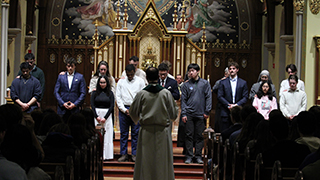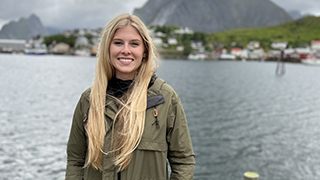Museum Professions Students Curate Online Exhibition 'Stress in the Time of COVID'
Tuesday, May 12, 2020
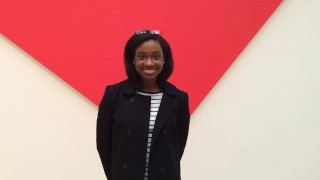
Monisha Bernard, M.A. Candidate in Museum Professions.
Graduate students enrolled in Museums Activism and Social Issues, a course in the College of Communication and the Arts, recently curated an online exhibition intended to help visitors cope with stress related to COVID-19. These students collaborated to provide resources, guidance, and comfort to visitors who may be experiencing new, familiar, or worsened stress and anxiety. The topics focused on include mental health, self-care, education, food insecurity, job insecurity, social media, and dealing with the future.
The coronavirus pandemic has impacted the world on a larger scale than this generation has ever seen, causing changes to everyday life and the way we interact with each other. As people work from home, go to their essential jobs, or face newfound unemployment, they may also experience fear, anxiety, depression, and stress. Students that are now required to participate in remote learning struggle with online platforms and have trouble remaining focused in a virtual classroom. Families must find a balance between homeschooling their children and working full time. In the background of these situations, people live with the fear of contracting COVID-19 or losing a loved one. This new reality prompted graduate students in the Museums, Activism and Social Issues class to focus their online exhibition assignment on the COVID-19 pandemic.
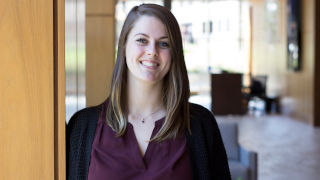
Devon Mancini, M.A. Candidate in Museum Professions.
The online exhibit titled, Stress in the Time of COVID-19, appeals to a wide audience, focusing on issues that are relevant to everyone living through this pandemic. If you are a student currently struggling with the changes in your education experience, Dual-Degree student Evan Robinson reminds you that we are all in this together. In her exhibition page, titled: Education During the Time of COVID-19, Robinson not only writes about inequalities in education that have become evident during this time, but also provides tips and resources for students who may be struggling to study from home. For many graduate students, adapting to a new school routine is accompanied by the stress of working from home or experiencing unemployment due to COVID-19. Monisha Bernard, a current M.A. in Museum Professions candidate and intern at the Newark Museum dedicated her exhibition page to job security, providing information and advice to visitors who are currently experiencing stress relating to their career. On her page titled: Global Spread of COVID-19, she writes, "Unemployment, whether temporary or permanent in a person's respective career, is an extremely stressful situation to be in. The uncertainty of future employment adds even more weight to your mental health. When you lose income, you begin to think of all your recurring expenses that then heightens your urge to find supplemental sources of income."
While many Americans struggle with financial instability due to the coronavirus, things like grocery shopping can become a source of stress. To help people cope with this stress and the fear associated with going to the grocery store, M.A. Candidate in Museum Professions Devon Mancini dedicates her exhibition page to providing information to visitors on how to maintain a nutritious diet while on a budget, as well as how to safely reduce virus exposure while shopping.
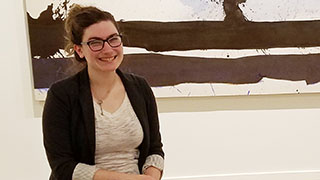
Katherine Himics, second-year M.A. in Museum Professions candidate.
While stuck at home, it is important to pay attention to stress and anxiety, reduce stressors in our lives when possible, and participate in self-care. Katherine Himics, a second-year M.A. in Museum Professions candidate, writes about mental health to educate visitors on causes, signs, and solutions/treatments to their current mental state. Coinciding with this, Katherine Nelson, a current M.A. in Museum Professions candidate, uses her exhibition page to highlight self-care practices. Samantha Becker, an M.A. in Museum Professions candidate focusing her studies on exhibition development, dedicates her page to social media, identifying the positive and negative aspects to look out for during this time. As she states, social media can trigger stress and anxiety, as well as spread misinformation and incite fear. Despite this, social media can also be a space where people find solidarity and comfort, or even show support to museums or other businesses. Becker encourages readers to identify the ways social media affects mental health, and to decrease possible stressors that come from social media when possible. With these three pages, visitors can become better equipped to identify, treat, and cope with their mental health during COVID-19.
The final page of the exhibition, written by second-year M.A. in Museum Professions candidate Rachel Recuero, helps visitors cope with the unpredictability of the future after this pandemic. Writing about things like job insecurity, the cancellation of important life events, and the bleakness of the situation, Recuero reminds visitors that despite what happens, life always bounces back. To close the exhibition, she writes: "We must try to stay connected to the world the best way we can and work hard to curb this virus and protect our loved ones. Our sense of community and our relationships with those around us will change… Enjoy that extra time with family that you would not normally have when your schedule has you running ragged. Reminisce about good memories and make plans with your friends once this is all over. Do not let the stress and confusion overwhelm you and take life day by day. We are all in this together no matter how isolated we are. Just remember to stay safe, be smart, and look forwards, not backwards."
Stress in the Time of COVID-19 is an exhibition created by the M.A. in Museum Professions Museums, Activism and Social Issues class. It will be available through WordPress on May 14, 2020.
The College currently offers Communication, including the opportunity to pursue a unique area of study, including options in Public Relations, Digital Communication/Communication Technologies, and Communication in Organizations. In addition, four dual-degree options, including three accelerated master's/B.A. programs and a dual M.A. degree with the School of Diplomacy and International Relations are offered.
For more information about College of Communication and the Arts, please contact Dr. Ryan Hudes.
Categories: Arts and Culture




